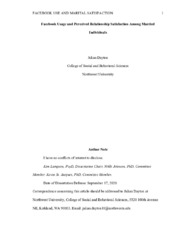| dc.description.abstract | Current research on the effects of social media usage on adults has exploded within the last 2 decades, yielding a variety of results and spawning a multitude of further studies. The present study sought to evaluate how social networking site (SNS) usage, specifically Facebook, affects the perceived marital satisfaction of a sample of married, heterosexual adults. Population. All participants (N = 293) were recruited through online platforms (Mage = 30.62, SD = 9.51; 29.3% female). All participants were married heterosexuals with the average number of years married was 6.94 years (SD = 8.11). Of those sampled, 37 (12.6%) had not previously used Facebook, and 256 (87.4%) had previously used Facebook to some extent. Method. This investigative study used an online survey in which respondents provided demographic information and answered a series of questions from the Couples Satisfaction Index (CSI-32) pertaining to their satisfaction in their marriages. Descriptive statistics of the key independent and dependent variables, as well as of the demographic statistics, were produced. Second, a correlation analysis was used to assess if among individuals who use Facebook if there is an inverse relationship between amounts of Facebook usage and relationship satisfaction. Third, an analysis of variance (ANOVA) was used to assess if there was an interaction between sex and Facebook usage (measured as a binary yes/no variable) on relationship satisfaction. Finally, pairwise comparisons (f-tests) were used to assess where there were male–female differences in relationship satisfaction based on Facebook usage. Results. The purpose of the present research was to investigate whether Facebook usage predicted relationship satisfaction. The current results provided partial support for the aforementioned hypotheses. First, among individuals who use Facebook, there was a marginal inverse relationship between the amounts of Facebook usage and relationship satisfaction. Second, Facebook usage predicted marital satisfaction differently for men and women. Specifically, the results indicated that among regular Facebook users, women had greater relationship satisfaction than men. However, among those that did not use Facebook regularly, no difference in relationship satisfaction between men and women was discovered. Moreover, regular Facebook usage did not predict women’s relationship satisfaction. However, regular Facebook usage did predict less relationship satisfaction among men. Discussion. Limitations to this study are explored. Further research is necessary to examine how other factors besides marriage affect SNS usage and marital satisfaction. | en |


 Maintained by the Northwest University Library
Maintained by the Northwest University Library